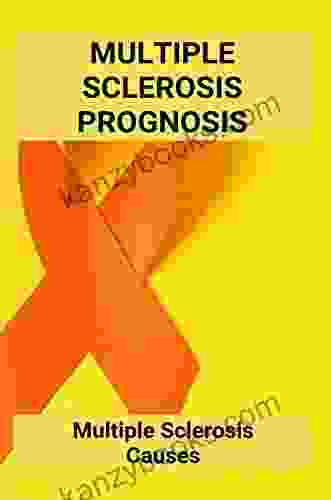User Guide to Multiple Sclerosis Medications: Empowering Informed Decisions

Understanding Multiple Sclerosis: A Complex Journey
Multiple Sclerosis (MS) is a chronic, autoimmune disease that affects the central nervous system, primarily targeting the brain, spinal cord, and optic nerves. It is characterized by an abnormal immune response that damages myelin, the protective sheath surrounding nerve fibers, leading to a disruption of nerve signals.
5 out of 5
| Language | : | English |
| File size | : | 3334 KB |
| Text-to-Speech | : | Enabled |
| Screen Reader | : | Supported |
| Enhanced typesetting | : | Enabled |
| Word Wise | : | Enabled |
| Print length | : | 291 pages |
| Lending | : | Enabled |
Navigating the Medication Landscape: A Path to Symptom Management and Disease Control
Managing MS involves a multifaceted approach, including lifestyle modifications, physical therapy, and a range of medications. This guide focuses on the comprehensive spectrum of MS medications, providing an in-depth understanding of their functions and applications.
Disease-Modifying Therapies: Slowing the Progression
- Interferons: Beta interferons (Avonex, Betaseron, Extavia, Plegridy, Rebif) and interferon gamma-1b (Actimmune) aim to reduce inflammation and modulate the immune response.
- Glatiramer Acetate (Copaxone): This synthetic protein mimics myelin components, helping to suppress immune attacks on the nervous system.
- Natalizumab (Tysabri): A monoclonal antibody, Tysabri selectively targets and inhibits immune cells involved in MS.
- Fingolimod (Gilenya): An immunosuppressant, Fingolimod blocks immune cells from leaving lymph nodes, limiting their ability to attack the nervous system.
- Dimethyl Fumarate (Tecfidera): This oral medication suppresses the immune system, reducing inflammatory activity in the central nervous system.
Immunomodulators: Regulating Immune Activity
- Azathioprine (Imuran, Azasan): An immunosuppressant, Azathioprine inhibits the production of immune cells involved in inflammation.
- Methotrexate: Primarily used for other conditions, Methotrexate can also suppress the immune system in MS patients.
- Cyclophosphamide (Cytoxan): A potent immunosuppressant, Cyclophosphamide may be used in severe cases of MS to suppress the immune system.
Biologics: Targeting Specific Immune Pathways
- Alemtuzumab (Lemtrada): Targeting CD52 proteins on immune cells, Alemtuzumab significantly depletes them from the bloodstream.
- Ocrelizumab (Ocrevus): A monoclonal antibody, Ocrevus binds to CD20 proteins on B cells, leading to their depletion.
- Cladribine (Mavenclad): Administered in two treatment cycles, Cladribine selectively targets and destroys immune cells.
- Ofatumumab (Kesimpta): This monoclonal antibody inhibits B cells, reducing inflammation in the central nervous system.
- Tofacitinib (Xeljanz): A JAK inhibitor, Tofacitinib blocks specific immune signaling pathways involved in inflammation.
Symptom Management Medications: Alleviating Specific Symptoms
- Baclofen (Lioresal): This muscle relaxant helps control muscle spasms.
- Tizanidine (Zanaflex): Another muscle relaxant, Tizanidine alleviates muscle stiffness and spasms.
- Sativex (nabiximols): A cannabis-based medication, Sativex may reduce pain and muscle spasms, and improve bladder function.
- Amantadine (Symmetrel): Primarily used for Parkinson's disease, Amantadine can also relieve fatigue in MS patients.
- Modafinil (Provigil): Typically used for narcolepsy, Modafinil may improve cognitive function and alertness in MS patients experiencing fatigue.
Administering Medications: Routes and Considerations
MS medications are administered via various routes, including:
- Injectable: Intermittent or regular injections under the skin or into a muscle.
- Oral: Ingested in pill or tablet form, offering convenience and self-administration.
- Intravenous (IV): Administered directly into a vein, typically used for more potent medications.
Potential Side Effects: Understanding and Managing
As with any medication, MS medications can cause side effects. These may vary depending on the specific medication and individual patient.
Common side effects include:
- Injection site reactions (redness, pain, swelling)
- Flu-like symptoms (fever, chills, body aches)
- Gastrointestinal issues (nausea, vomiting, diarrhea)
- Fatigue
- Skin reactions
- Hair loss
Considerations for Patient Education and Empowerment
Effective MS management requires a collaborative approach between patients and healthcare professionals. Patient education is crucial to:
- Understanding the underlying disease process and treatment options
- Making informed decisions about medication selection and administration
- Managing potential side effects
- Monitoring disease activity and adjusting treatment plans as needed
: Advancing MS Care through Comprehensive Medication Management
Multiple Sclerosis medications play a vital role in managing disease progression, alleviating symptoms, and improving overall quality of life for patients. This guide provides a comprehensive overview of the various medications available, their mechanisms of action, administration routes, and potential side effects.
Empowering patients with knowledge about MS medications enables them to actively participate in their treatment decisions and engage in shared decision-making with their healthcare team. This collaborative approach leads to more informed choices, improved outcomes, and enhanced patient well-being.
As research continues to advance, the future holds promise for the development of even more effective MS medications, further enhancing the lives of patients.
5 out of 5
| Language | : | English |
| File size | : | 3334 KB |
| Text-to-Speech | : | Enabled |
| Screen Reader | : | Supported |
| Enhanced typesetting | : | Enabled |
| Word Wise | : | Enabled |
| Print length | : | 291 pages |
| Lending | : | Enabled |
Do you want to contribute by writing guest posts on this blog?
Please contact us and send us a resume of previous articles that you have written.
 Book
Book Novel
Novel Page
Page Chapter
Chapter Text
Text Story
Story Genre
Genre Reader
Reader Library
Library Paperback
Paperback E-book
E-book Magazine
Magazine Newspaper
Newspaper Paragraph
Paragraph Sentence
Sentence Bookmark
Bookmark Shelf
Shelf Glossary
Glossary Bibliography
Bibliography Foreword
Foreword Preface
Preface Synopsis
Synopsis Annotation
Annotation Footnote
Footnote Manuscript
Manuscript Scroll
Scroll Codex
Codex Tome
Tome Bestseller
Bestseller Classics
Classics Library card
Library card Narrative
Narrative Biography
Biography Autobiography
Autobiography Memoir
Memoir Reference
Reference Encyclopedia
Encyclopedia Sir Robert Anderson
Sir Robert Anderson Seth Godin
Seth Godin Valeria Ray
Valeria Ray Teri M Bethel
Teri M Bethel Tovah Martin
Tovah Martin Robert Spencer
Robert Spencer Mia Gordon
Mia Gordon Marianne Bradford
Marianne Bradford Todd Richards
Todd Richards Sri Owen
Sri Owen William Sleator
William Sleator Paul Mcilhenny
Paul Mcilhenny Sigma Publishing
Sigma Publishing Solomon Briggs
Solomon Briggs Frank Pasquale
Frank Pasquale Valerie Evans
Valerie Evans Sarah L Moore
Sarah L Moore Susan Hollister
Susan Hollister Thaddeus Kane
Thaddeus Kane Sergei Boutenko
Sergei Boutenko
Light bulbAdvertise smarter! Our strategic ad space ensures maximum exposure. Reserve your spot today!

 John ParkerUnveiling the Transformative Power: Exploring the Depths of "Of Mindfulness...
John ParkerUnveiling the Transformative Power: Exploring the Depths of "Of Mindfulness...
 George R.R. MartinThe Tao Te Ching of Divorce: A Path to Healing and Renewal in the Face of...
George R.R. MartinThe Tao Te Ching of Divorce: A Path to Healing and Renewal in the Face of... Chinua AchebeFollow ·4.9k
Chinua AchebeFollow ·4.9k Maurice ParkerFollow ·12.2k
Maurice ParkerFollow ·12.2k Kurt VonnegutFollow ·13.3k
Kurt VonnegutFollow ·13.3k Corbin PowellFollow ·12.7k
Corbin PowellFollow ·12.7k Holden BellFollow ·14.3k
Holden BellFollow ·14.3k Ethan MitchellFollow ·8.2k
Ethan MitchellFollow ·8.2k Cooper BellFollow ·6.9k
Cooper BellFollow ·6.9k Richard WrightFollow ·7.9k
Richard WrightFollow ·7.9k

 Virginia Woolf
Virginia WoolfGetting High Fat Diet Easily Using Keto Fat Bomb Cookbook
Unveiling the Power of Fat...

 Milan Kundera
Milan KunderaAre You Cryin' Brian? Find the Inspiration and Humor in...
Life can be full of...

 Edmund Hayes
Edmund HayesUnlock Your Vitality: The 15-Day Natural Energy Boost...
Are You Ready to...

 Gavin Mitchell
Gavin MitchellMultiple Sclerosis Life Expectancy: Unveiling the Impact...
Multiple Sclerosis (MS) is a...

 Gabriel Garcia Marquez
Gabriel Garcia MarquezGet The Thighs That Can Crack Man Head Like Walnut
Are you tired of weak, flabby...
5 out of 5
| Language | : | English |
| File size | : | 3334 KB |
| Text-to-Speech | : | Enabled |
| Screen Reader | : | Supported |
| Enhanced typesetting | : | Enabled |
| Word Wise | : | Enabled |
| Print length | : | 291 pages |
| Lending | : | Enabled |










